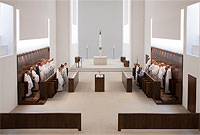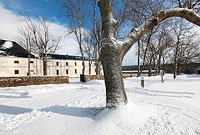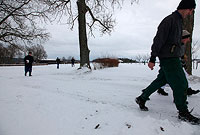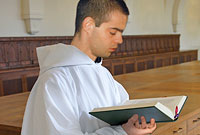Letter to our friends
February 2009
Living wide awake
Dear Friends,
It has been six months since I last wrote to you. The days, the weeks and the months have slipped by, taking with them a daily life about which there is little to say. Aside from the ordinary and daily practice of our monastic life, we have been wrapped up in the young brothers whom we must form, encourage and support. Because of printing delays, when you read these lines, it will have been a whole month since I wrote this text. France is recovering from the emotion caused by the iniquitous attacks. Once the surprise had passed, there was no lack of Christian voices, sensibly expressing themselves. What do the monks think about all this? At Sept-Fons (where I have not been since the diaconal ordination of Brother Daniel last August), as at Novy Dvur, we try to understand and to react. As with any drama, some would be tempted to say, “It’s not that serious!” and others, “It’s not true!” The temptation is either to entertain a carefree attitude or else to give in to fear. The past century saw us fall into one or the other of these traps.
We know that the real solution is neither here nor there. Saint Benedict, who lived during the time of the barbarian invasion of Rome, does not mention these troubles in the Rule. While of course interested in the surrounding reality, this reserved attitude inclines a monk to not immerse himself in waters that are foreign to the monastic life. However – and this is not contradictory – a certain conviction runs throughout the Rule: to act on those superior realities that seem inaccessible, the best way is to put into play humble, daily personal attitudes that are rooted in concrete reality. Saint Benedict had the conviction that everything makes sense, that no fruitful spiritual attitude may be established on the foundation of deformed behaviour (“curves,” to borrow one of Saint Bernard’s words), be it a question of moral life, of psychological balance, of social justice – in other words, of attention to others. Unless one is a well-known personality of political or religious importance, or the head of a command, a person has no other means of acting for the good of those closest to him than his own personal means, in the milieu where he lives, exercising an influence that could qualify as microcosmic. Yet to think that this mode of action is inefficient would be a grave error. The dissidents of totalitarian regimes have proved it. As for the monk, he agrees to turn his back on ordinary methods, believing that his whole life, and not just his prayer, has a supernatural efficiency. Without that conviction, would he speak of “intercession,” of that hidden fruitfulness that he exercises on his contemporaries? We have a responsibility to exercise – simply because we adhere to them – true principles, and to live in coherency with them. This effort can be costly, and often gives rise to lively contradictions. Even if the scope of that responsibility seems limited, these limits do not reduce its influence. Other “dissidents” have resisted and continue to resist the effects of the social crisis and its consequences on the religious life of the Christian West. Whoever knows how to see and analyse the real issues – even if only for the sole purpose of straightening things out for himself – acts as a lever on the destiny of others who are less capable of reacting. That these righteous testimonies may be heard, or may remain silent, takes away none of their efficiency.
We have recently celebrated the thirtieth anniversary of the death of Father Jerome. In 1942, when he learned through priests staying at the guesthouse that the Nazis were exterminating the Jews, it was as if lightning had struck at his feet. He was 35 years old, when a person’s strength is intact and emotions lively. He said to himself, “You are here, and at this very moment there are men and women of your age who, for no reason, are suffering and dying in horrible circumstances.” After Compline, he went to find an elderly Father in whom he had confidence. The senior member listened to him, remained silent for a long time, then told him, “And you, in the meantime, right here, are you having fun? Are you dancing, are you gaining from things here while others suffer? So, remain tranquil before God. If you lead here, with your normal diligence, without closcing dowrself, your monastic life, or the requirements of your vocation, you can be tranquil, and God will not reproach you for anything – nor will your conscience.” We would like our attitudes to be inspired by his example.
And your own? The Father Master of Sept-Fons, whom I asked the other day about the nature of poverty, answered me thus: “Our exercise of poverty is the most rigorous practice of our uncommon vocation. For the Jesuits, the vow of obedience (to the letter) to the Pope; for the Franciscans, going to preach while speaking to the birds; for us, the Divine Office, based on personal prayer and strict enclosure. I am joking, but there is something in it.” It is in this direction that each of us must reflect and act. I leave you with a reflection taken from my readings, from Chantal Delsol: “Remember the future! (cf. Dt 25, 17-19) […] Don’t forget that the rest of history is in your hands: don’t rest; keep your promises; be faithful to yourself. ‘Never again!’ says the contemporary Vulgate after the 20th century and the Holocaust, which means: don’t forget that you are not subject to fate; it is up to you that the same events don’t happen again; don’t fall asleep, but keep watch, for history bears your name.”
The Father Prior of Sept-Fons and Brother Aloïs left for Venezuela, where they will stay for three months with the brothers of the Trappist monastery of Our Lady of the Andes. Father Sebastian of Sept-Fons and our Prior have just returned from Senegal. Father Procopius just flew off to Asia, to another monastery where they live in trying conditions. Accompany them with your prayer. When you help us, it is these monasteries that you are helping. For once, we will not talk to you about our worksites. Not that they do not exist, but it is not useful to always come back to this subject. We thank you for your faithful support and assure you of our prayers,
To be or not to be CHARLIE Immediately after the events that shook us all, I said the following to the brothers of Novy Dvur: I would be CHARLIE if all those who had taken to the streets had declared themselves, a few months ago, CHRISTIANS OF IRAQ. If the fifty chiefs of state who came to defend the liberty of expression in Paris had first gone to China, to defend it in Hong Kong and on the continent. If the media had given the same attention to two thousand victims massacred in Africa as to twenty in Europe. If the planet that trembled over the distress of developed countries also knew how to take into consideration the youth who are at risk of becoming terrorists… I am CHARLIE against blind violence, especially if it pretends to be justified by God, without being so, while at the same time being so. I believe that every man is responsible for his actions, that the boundary between good and evil crosses through the heart of aggressors and victims, that this reassuring movement of fraternal solidarity will not resolve the real problems, unless it helps to ask the real question: What have we done to get to this point?
Br. M. Samuel, abbot of Nový Dvůr
Fourth letter of the Father Master of Sept-Fons to Father Lev, Father Master of Nový Dvůr
December 7, 1961-1989-2014, 25th anniversary of the death of Brother Theophane
September, 2nd 2014
Autumn 2013
July 5, 2013
March 10, 2013
A few weeks before Christmas 2012
September 2, 2012, Solemnity of the Dedication of Novy Dvur
Whit Sunday 2012
January 11, 2012
September 30, 2011, Feast of Saint Jerome
May 1 2011
September 2 2010
May, 2010
January 29, 2010
Pentecost 2009
February 2009
May, 2008
February 2, 2008
September 2, 2007
July 5, 2007
September 2, 2006
March 25, 2006
February 2, 2006
September 2, 2005






